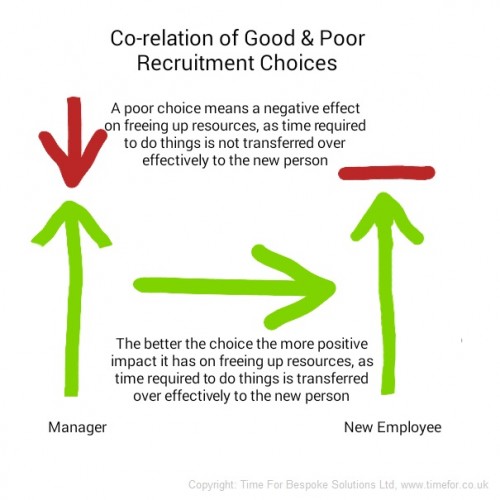Choices! Yes I have used this word deliberately in this post, as we employers ultimately are responsible for the decisions (i.e. choices) we have made relating to the people we have chosen to work within our organisations. Now all of this (good, bad or indifferent) is a reflection on our interviewing techniques and selection criteria. And to be truthful, how many of us can truly call ourselves expert recruiters? Unfortunately unless you are specifically trained, or doing it all the time, or part of a larger organisation that has HR support in this respect, the chances are that recruitment is something you only do now and again, as/when the need arises.
So what precisely is it all about? Well most of the time (in fact always as far as I can think of) it is because there is a problem (e.g. lack of resource or expertise) and you (or someone else in your team) are looking for a solution. It is therefore so, so important that in making your decision that you do actually solve the problem. There is the challenge: sometimes not only does your choice fail to deliver upon what is required, but additionally it is such a poor choice that it actually has a negative impact upon your ability to get through the other things on your desk that you are responsible for. Yes, a bad choice has a negative impact upon your time, in that not only are you unable to allocate or transfer the tasks over to the new employee (so the problem has not been resolved, and you now have the expense of an additional salary), but you are also having to manage the situation going forward (i.e. a negative drain on your time). At this stage, assuming that training, coaching etc. have all been properly implemented you may need to be considering going down the route of a PIP (Performance Improvement Plan), and you would need to be a complete saint for not thinking, at least for a few seconds, “If only I had picked the other person for the role at the outset”. Sadly some managers fail to address such issues head on and just let things slide (it’s too difficult; I don’t know what to do; it’s easier just to be nice and forget about it; hopefully they might leave soon and I won’t need to do all the paperwork… ). The issue with not tackling the situation ‘head on’ is that the problem that was so desperately needing to be resolved (to the point that you went into the marketplace and employed someone) is still there and is still not being dealt with efficiently or effectively (if at all!). So it needs to be tackled – and hopefully this will be demonstrated with an improvement in performance by the individual, but ultimately if not, then more drastic action may be needed. Either that or you are accepting that it wasn’t such a big problem in the first place!! REALLY – that’s interesting! That wasn’t what you were saying many months ago when you persuaded someone to release the funds to employ the person.
So here’s a thought. In this situation how often does the first step in the process (e.g. your initial decision as to who to employ) get looked at in any great detail. Are you, as the recruiter, not at least partly responsible for the outcome of your decisions? Yes it’s extremely difficult to know precisely, on the back of an interview, what you are going to get when the new start walks through the door next Monday, but can you be better at ascertaining likelihood of success at the outset? I bet we all could be better at this. OK, it won’t always be perfect, bad decisions will fall through the cracks, but hopefully there will be many more better decisions and you can reflect upon the bad ones to help ensure that you make better ones going forward. The point is to realise that this is a massive decision about a person you are about to employ, and it is full of potential benefits and costs. So, do your homework on the candidate, ask the right questions, put them under pressure, get proper references, follow your HR departments steer (to a point!), but ultimately, having done all of that and more, what is your gut instinct telling you?

